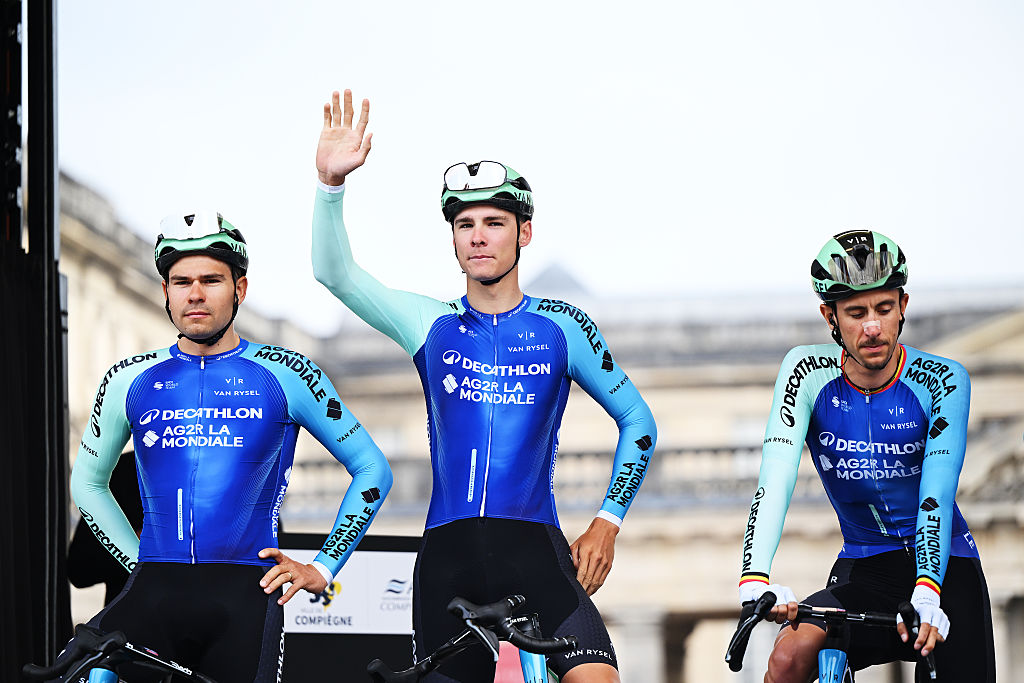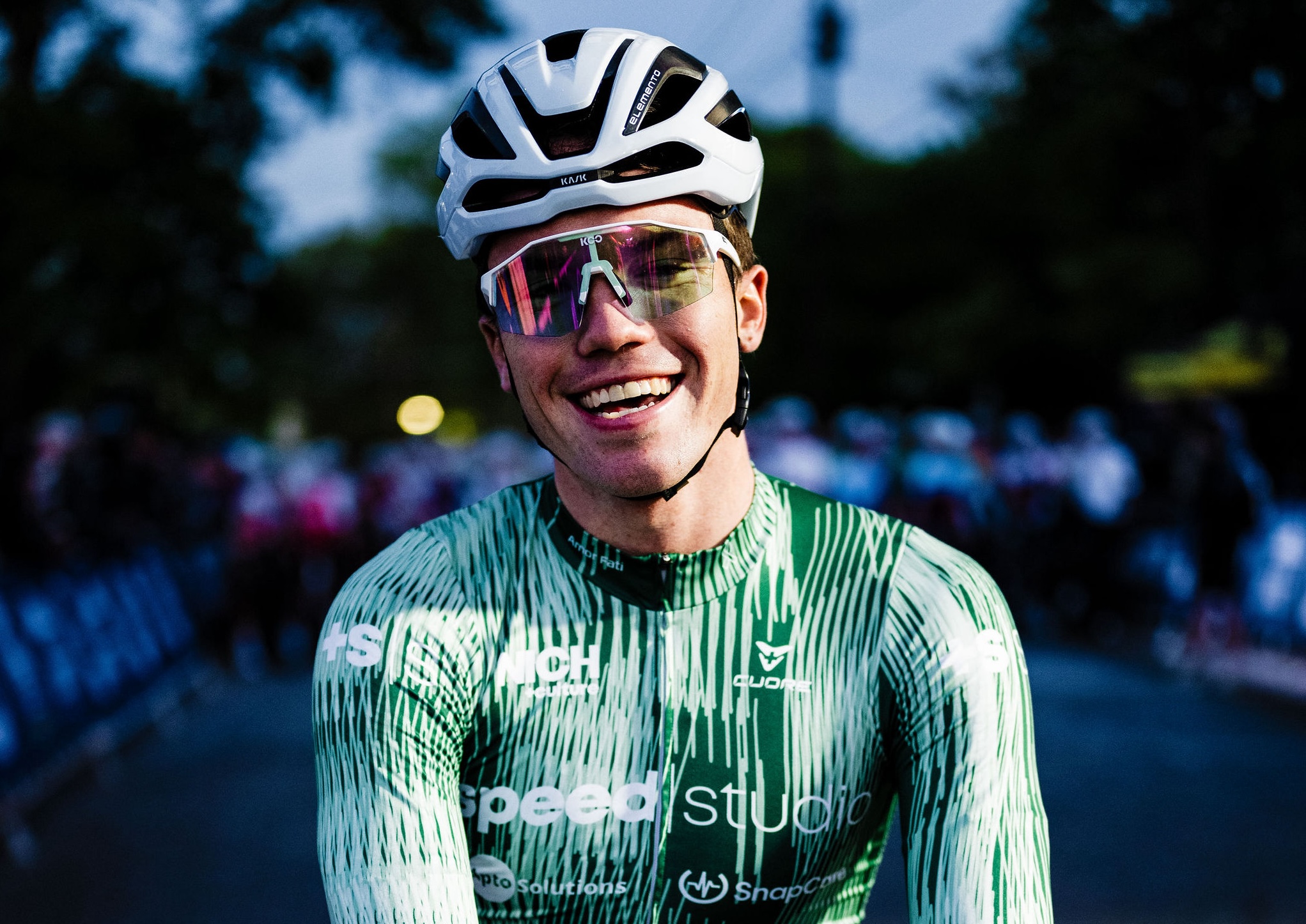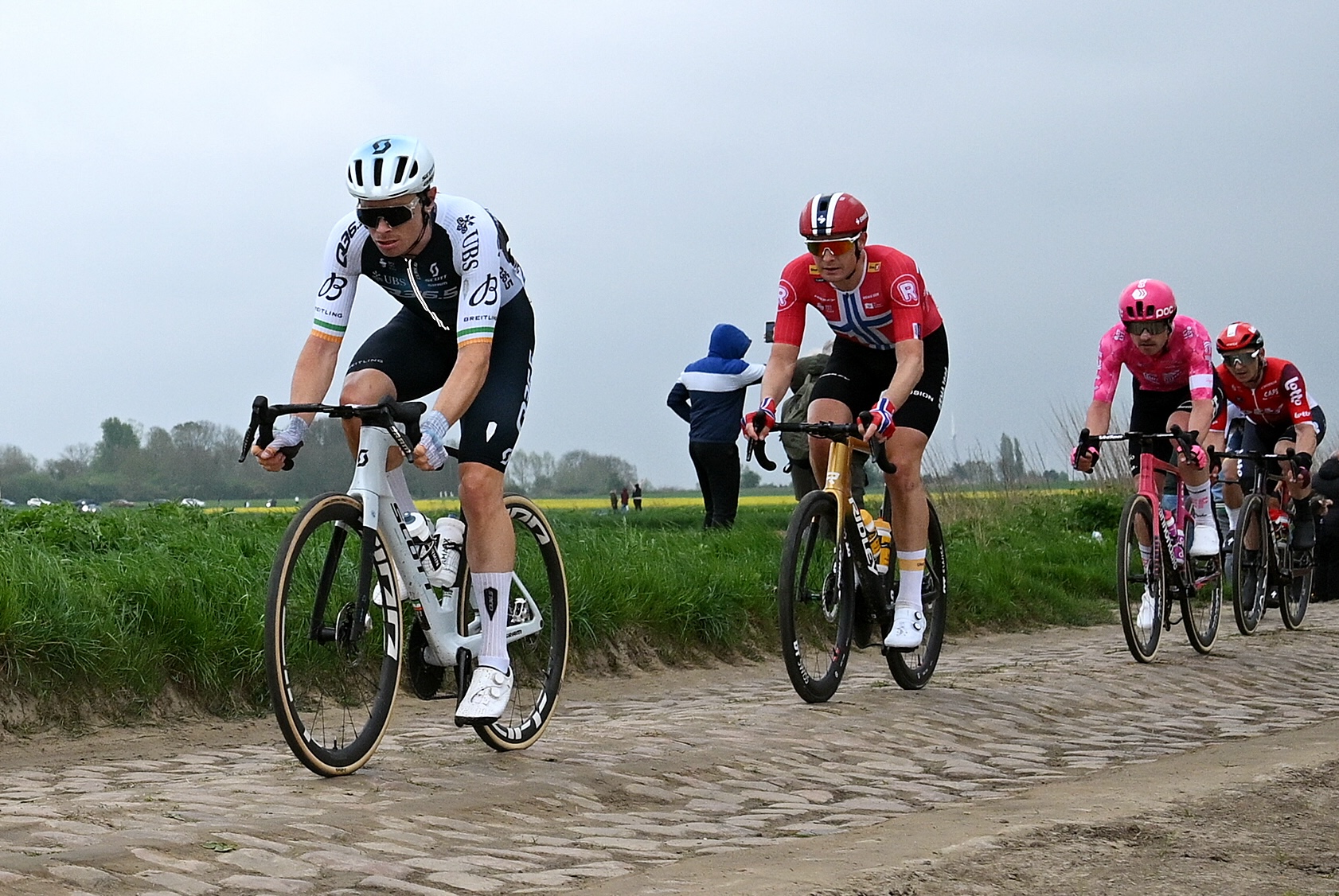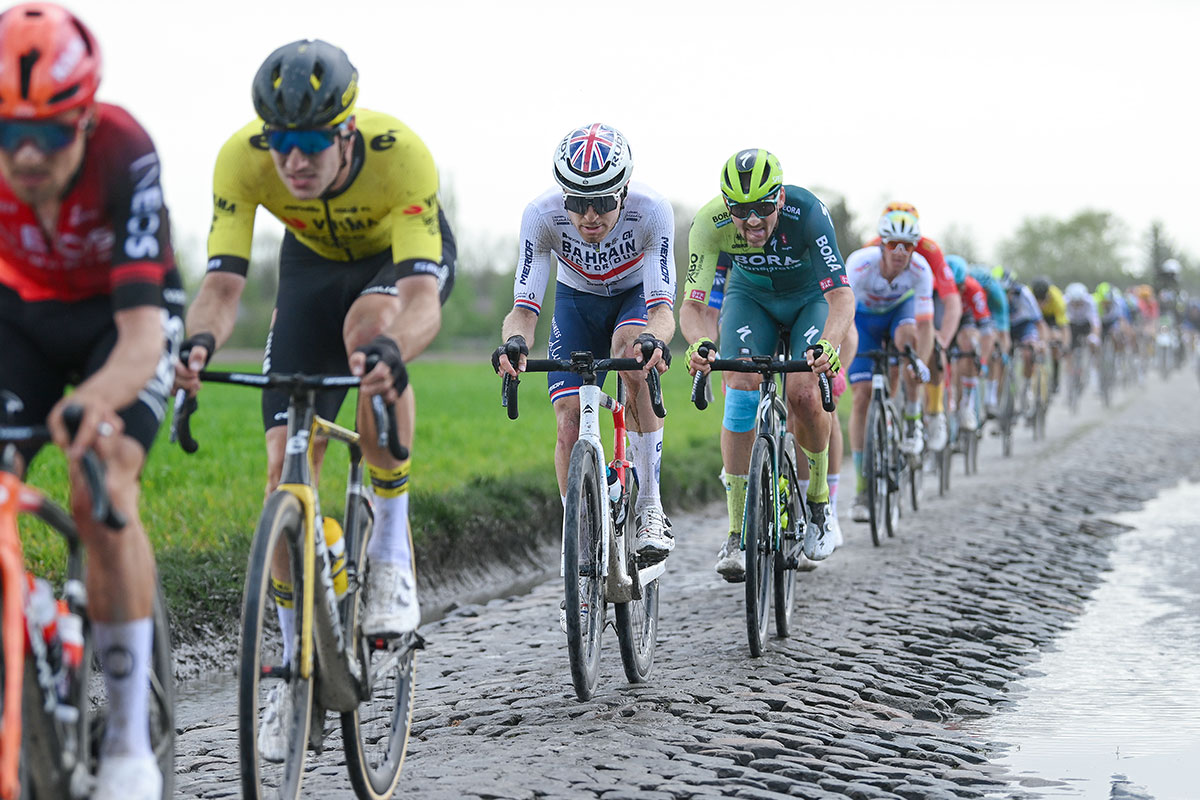All for one, one for all!
This evening in L'Alpe d'Huez, more than one bottle of champagne will pop in team CSC-Saxo Bank's...
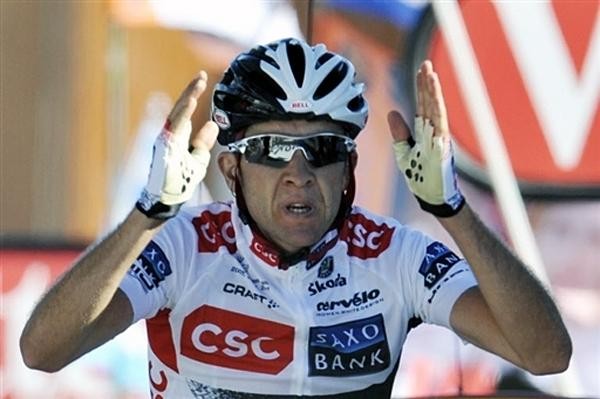
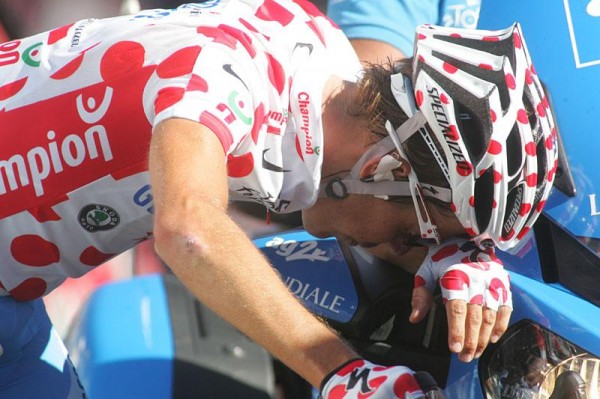
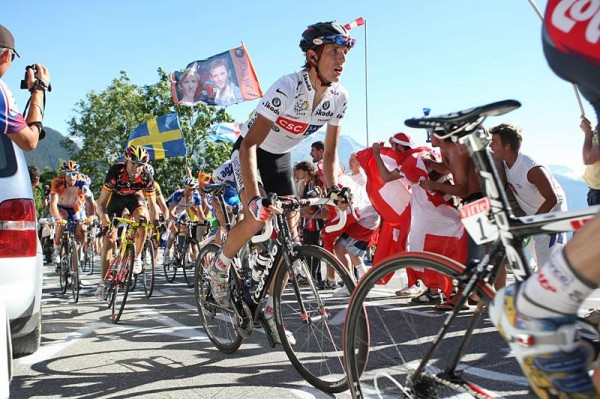
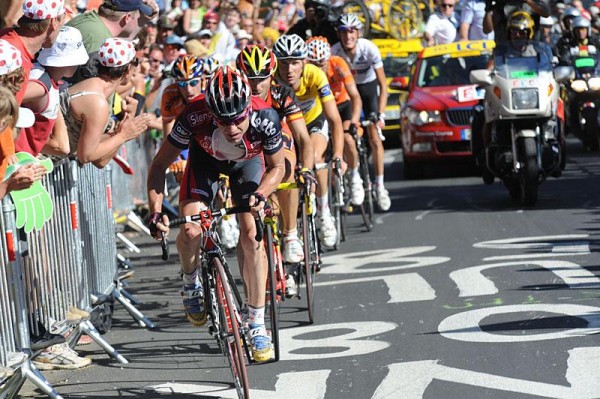
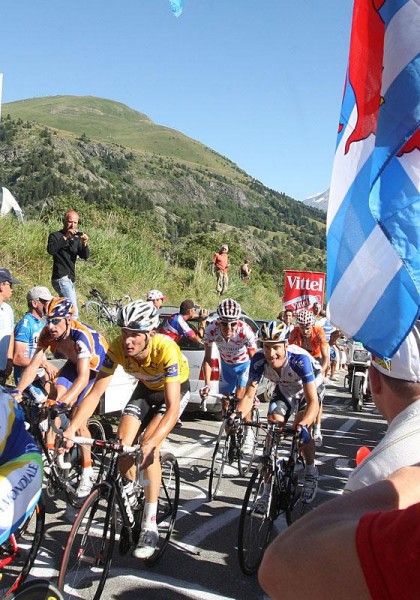

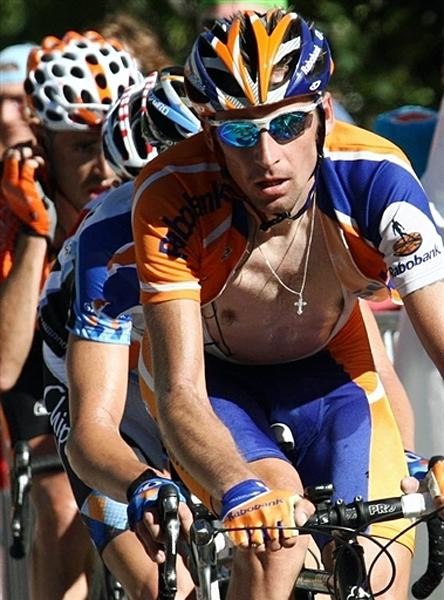
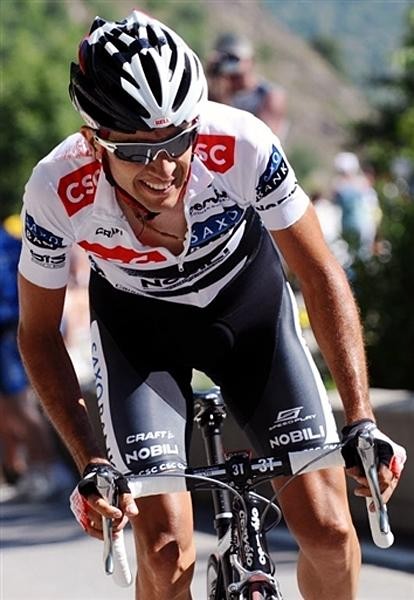
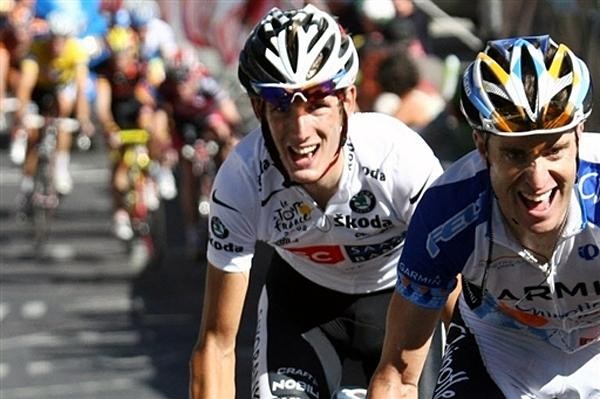
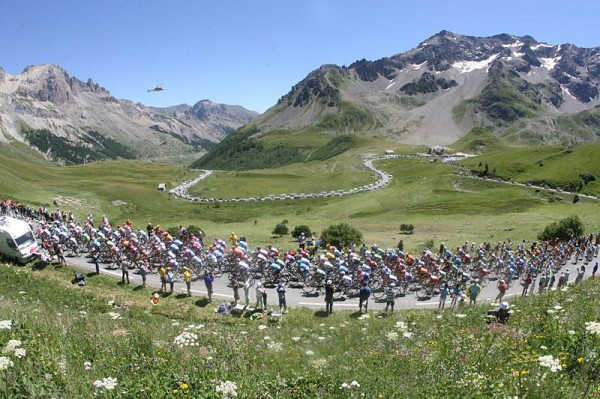

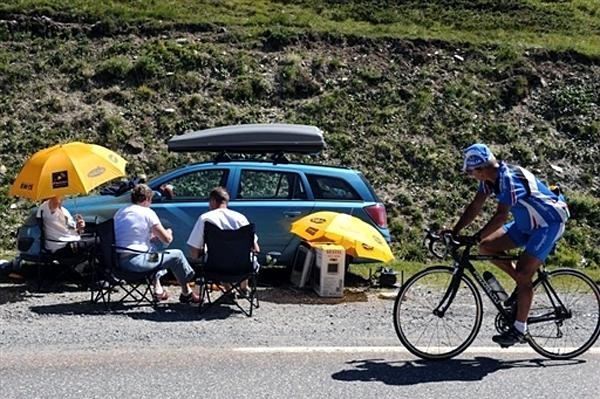



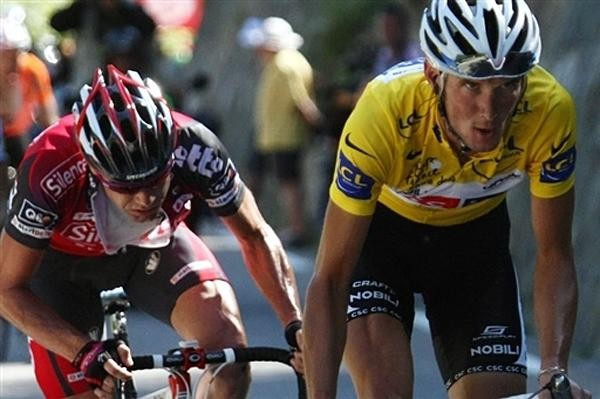
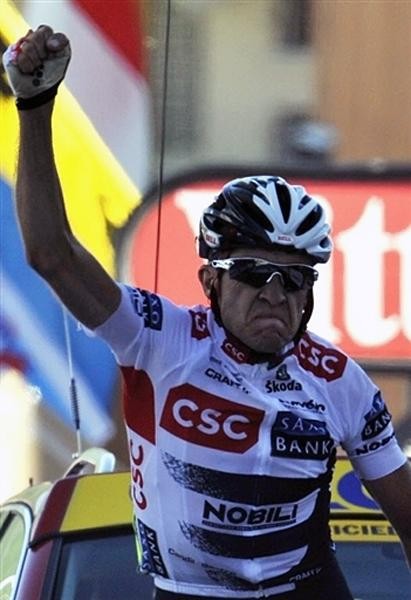

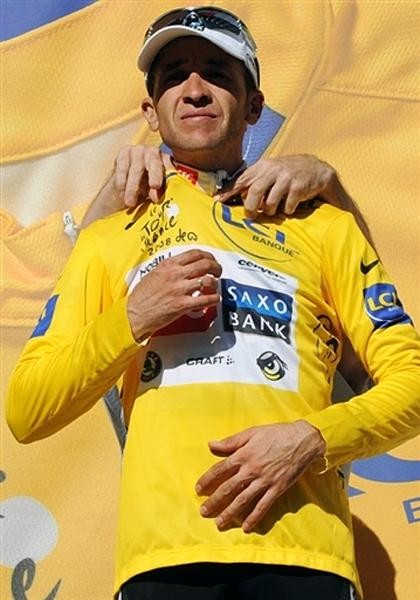
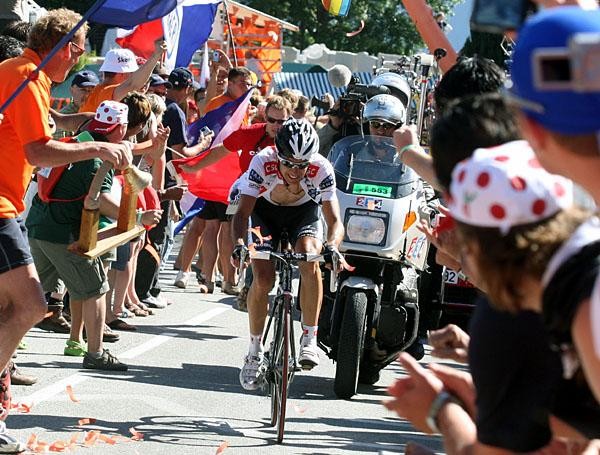
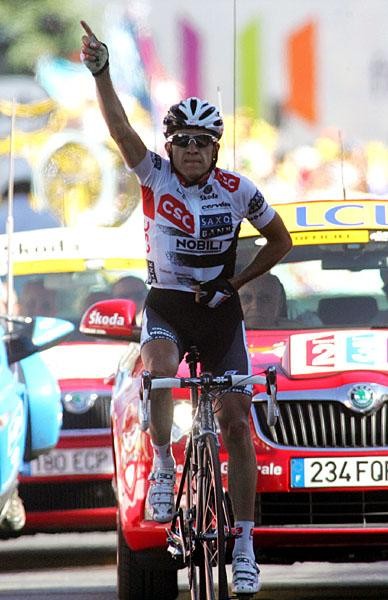
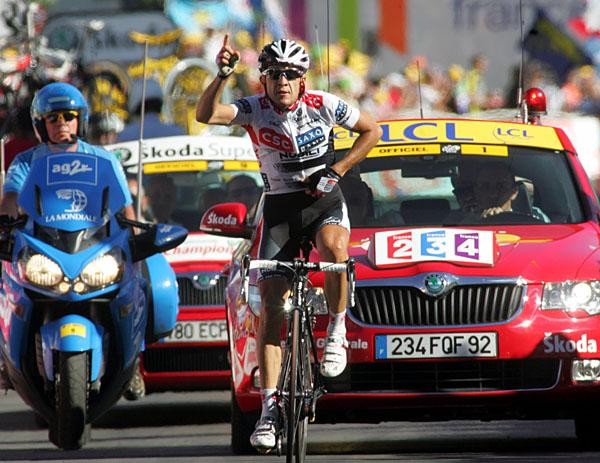
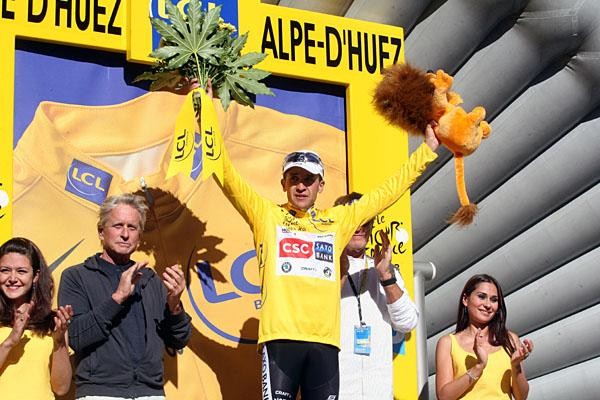
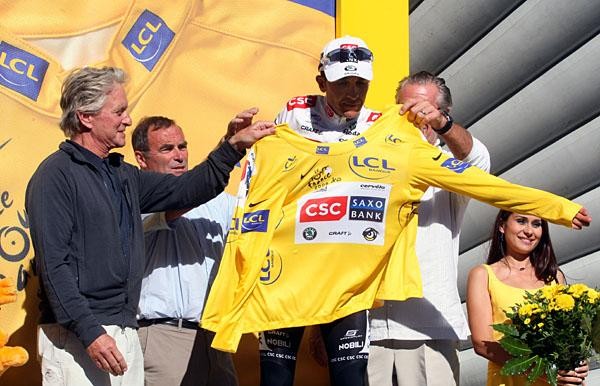
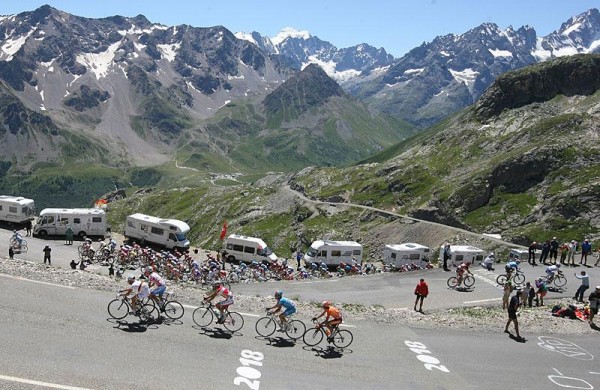
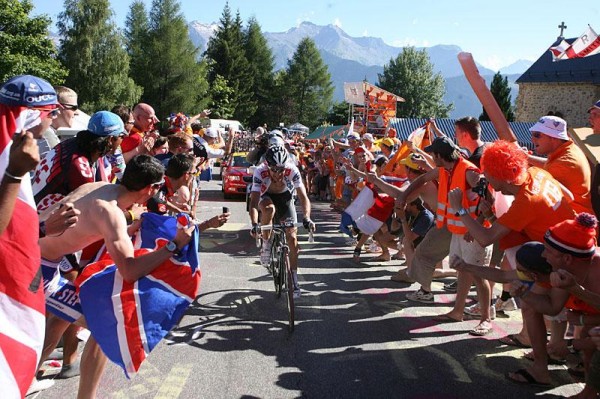
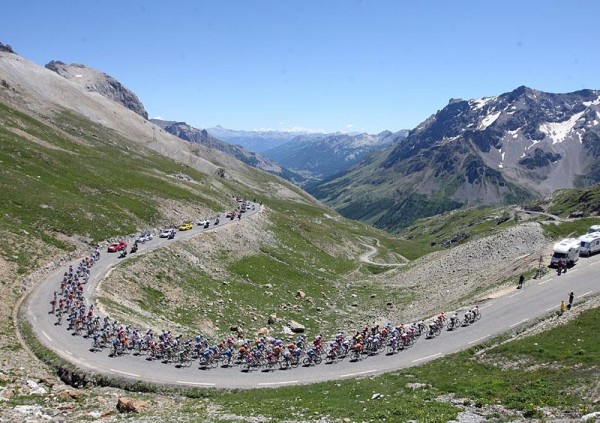
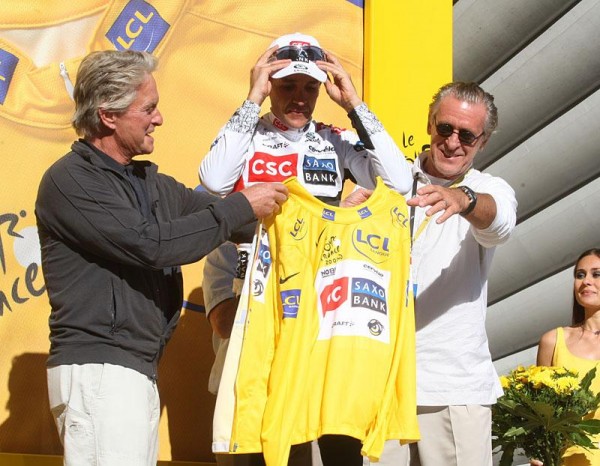
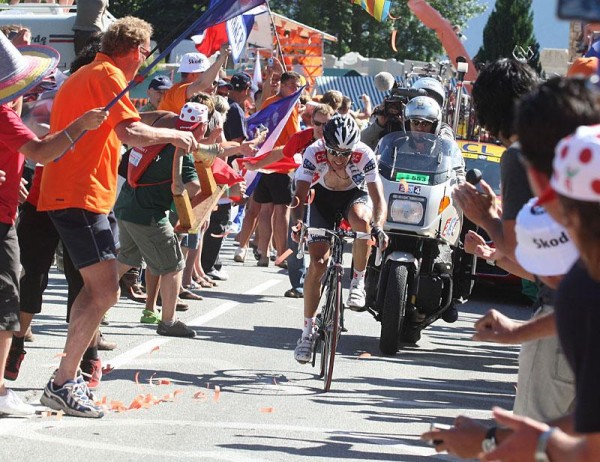
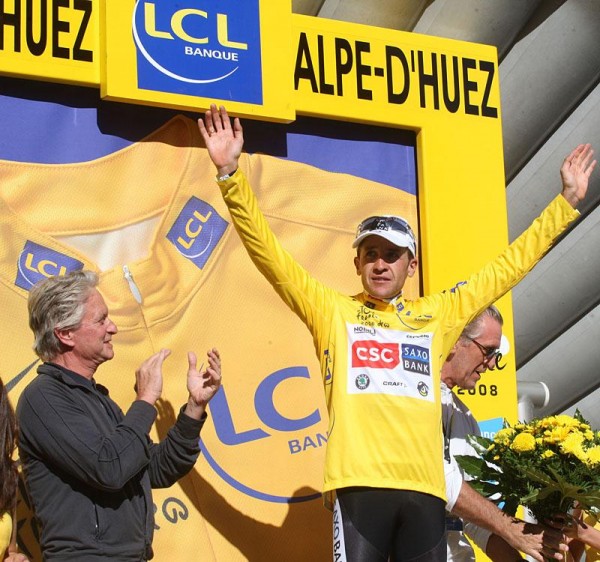
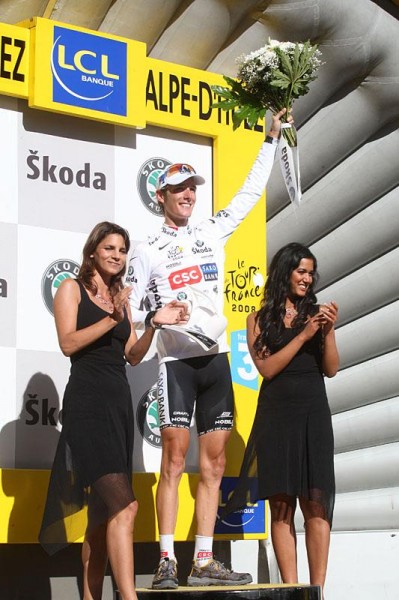


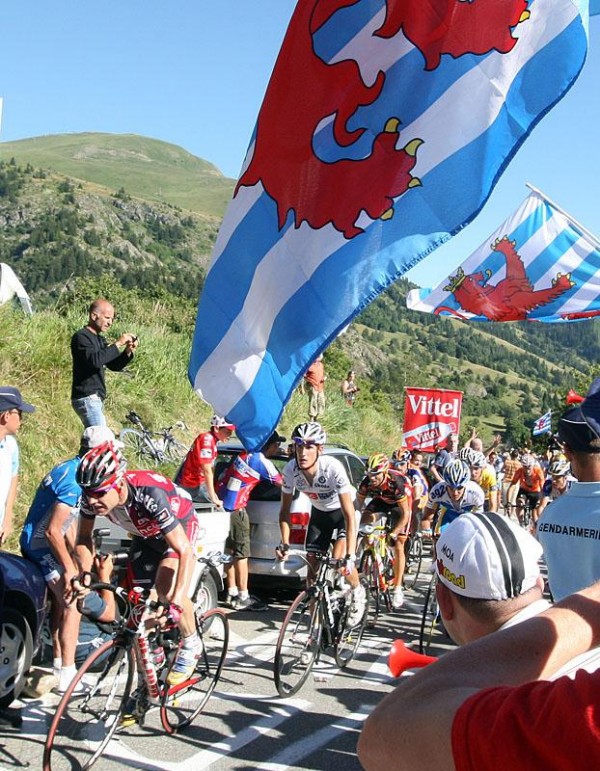

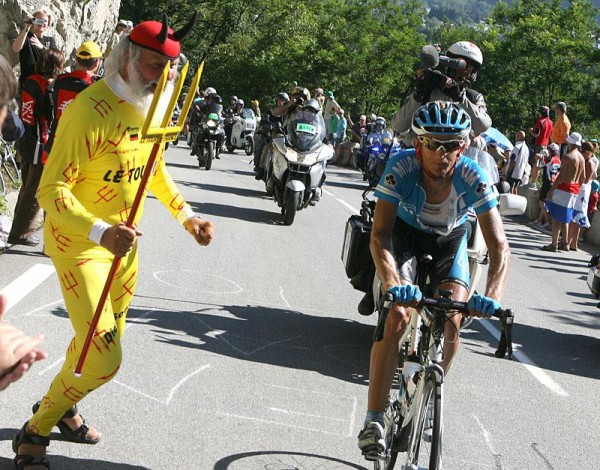
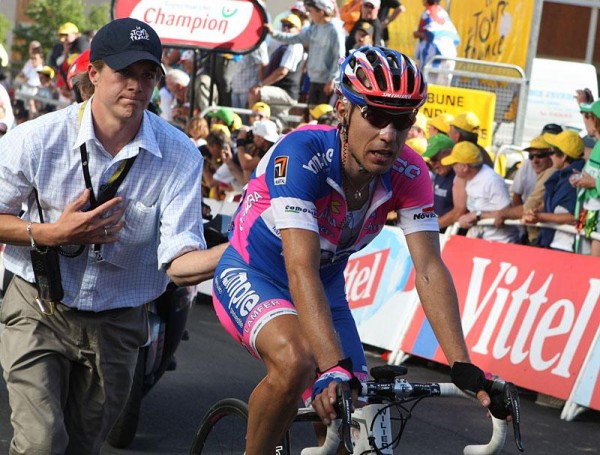
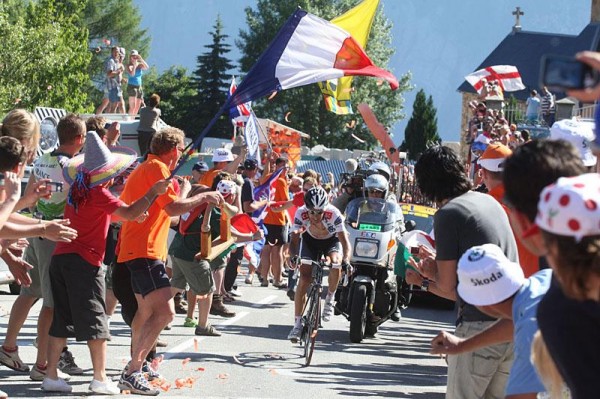
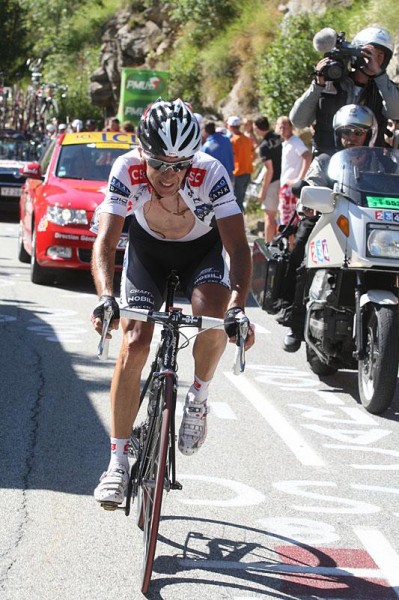

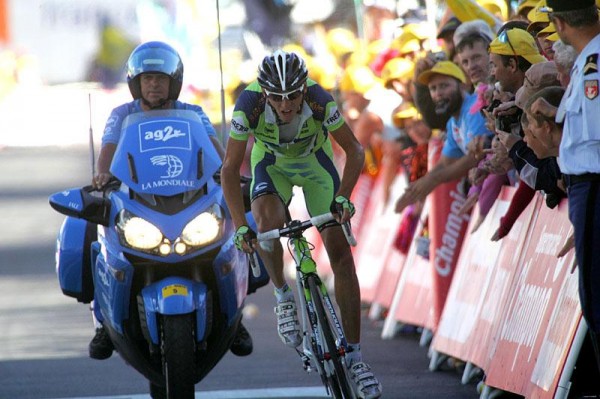
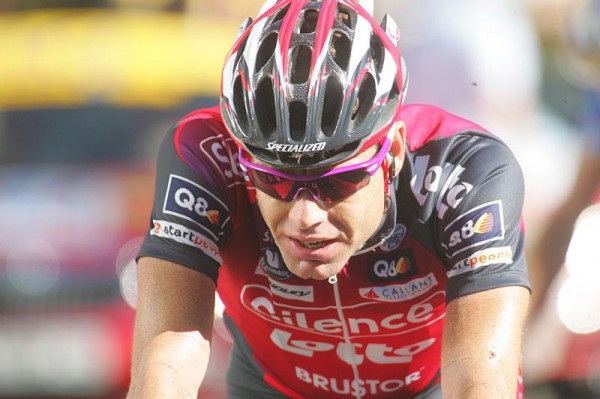
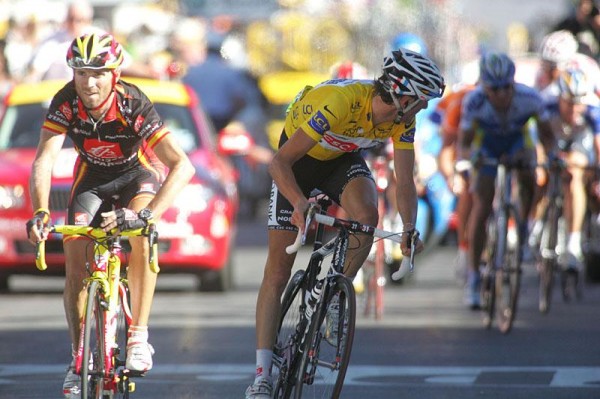
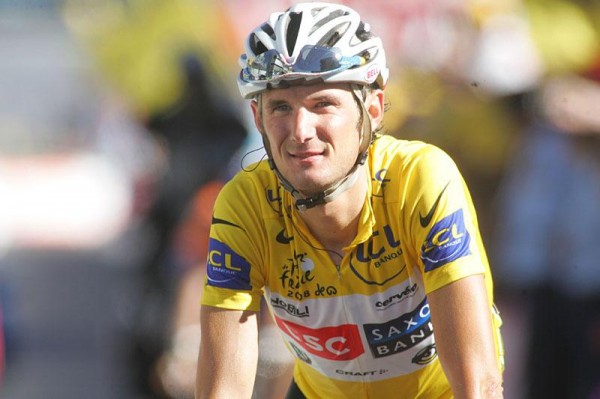
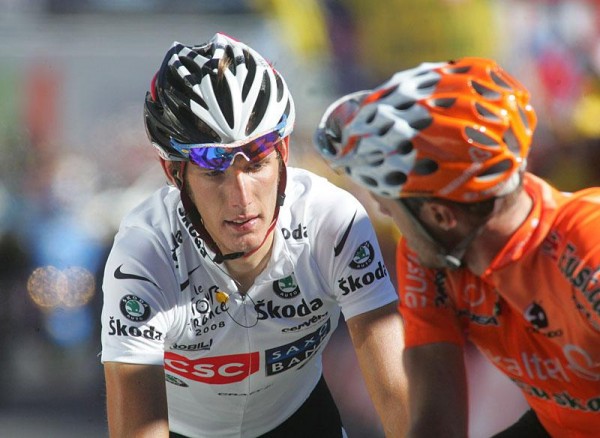
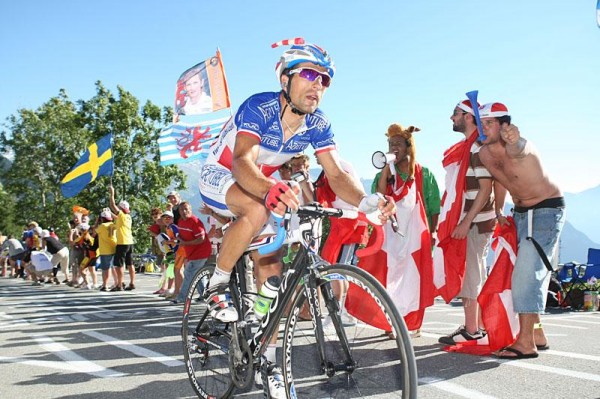
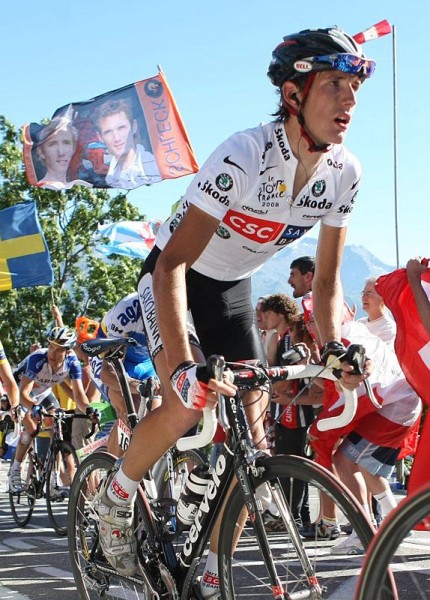


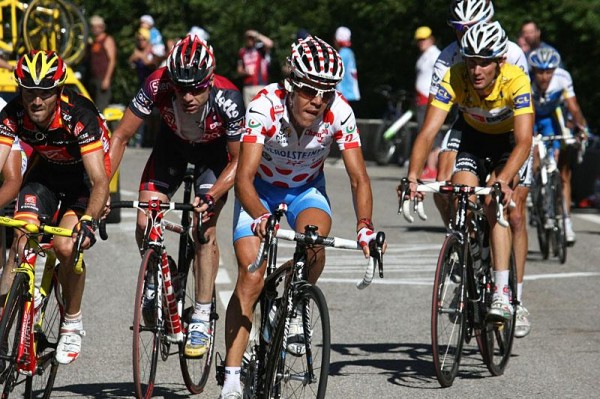
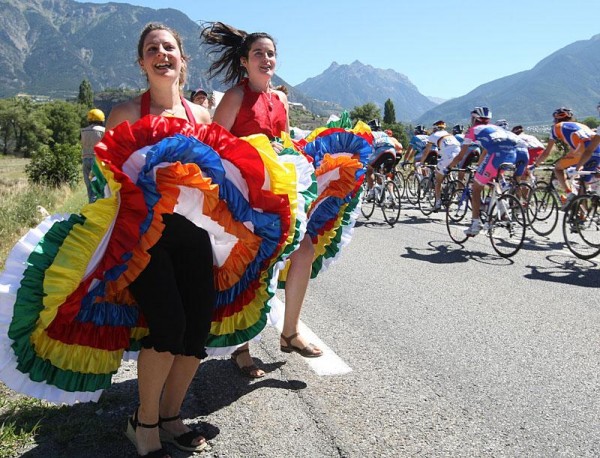
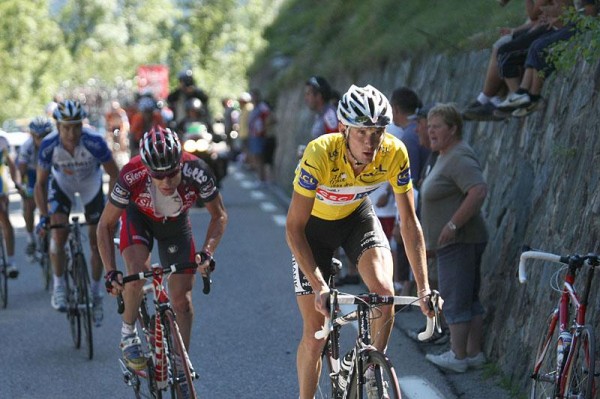
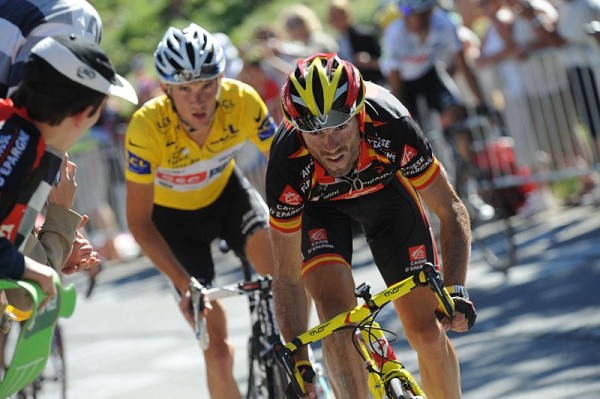
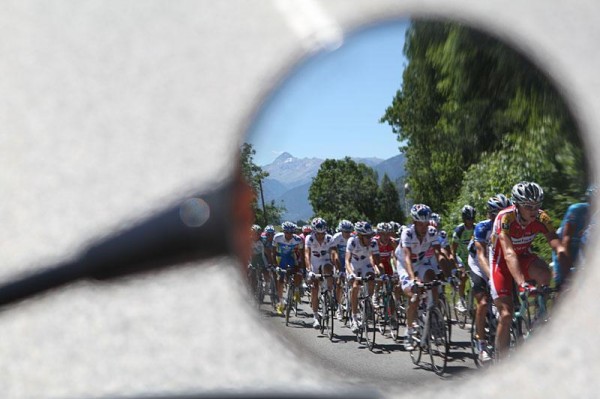
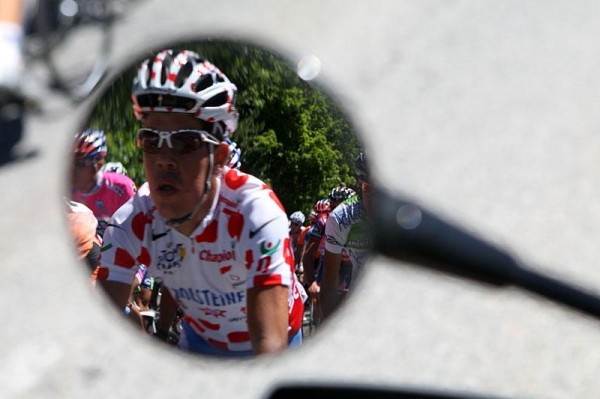
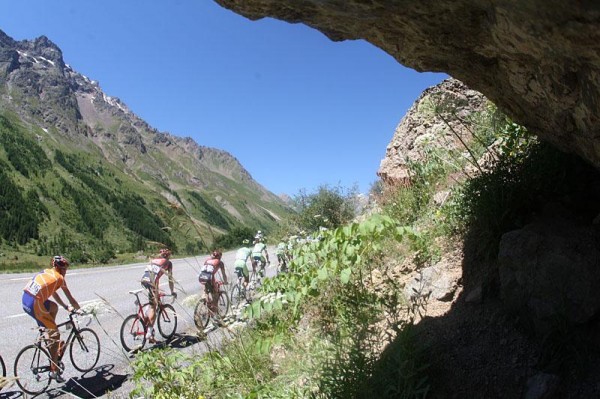
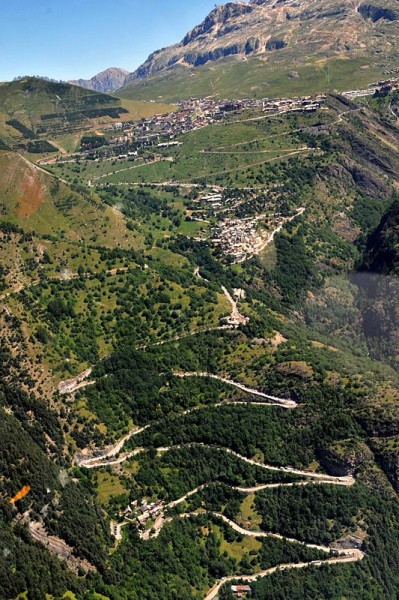
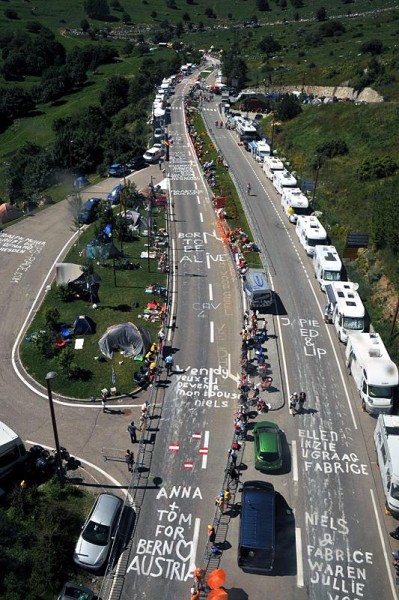
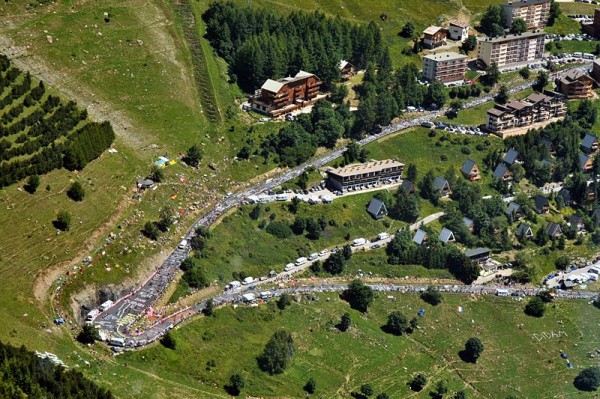
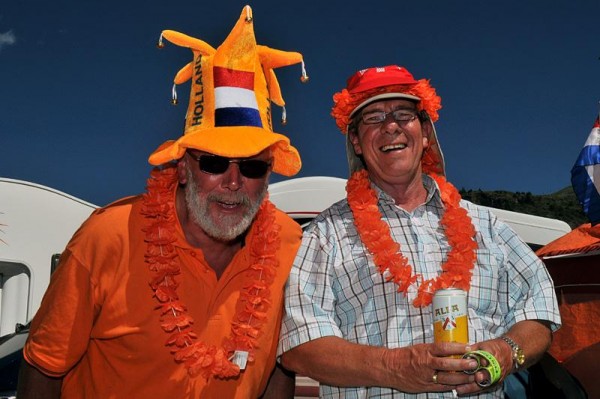
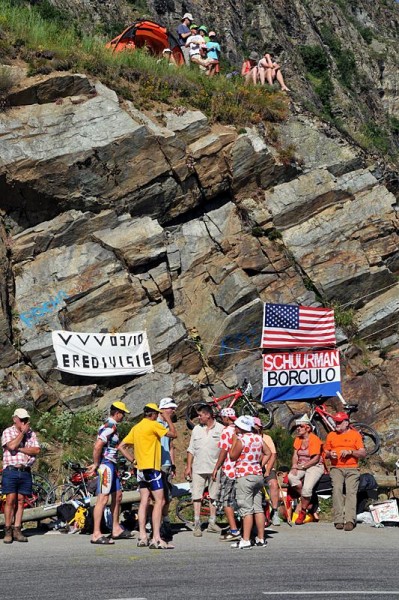
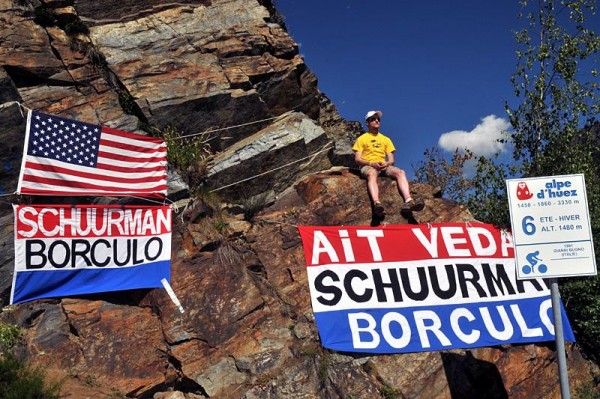
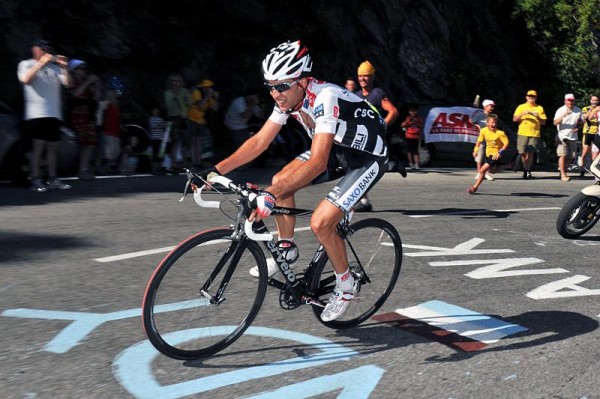
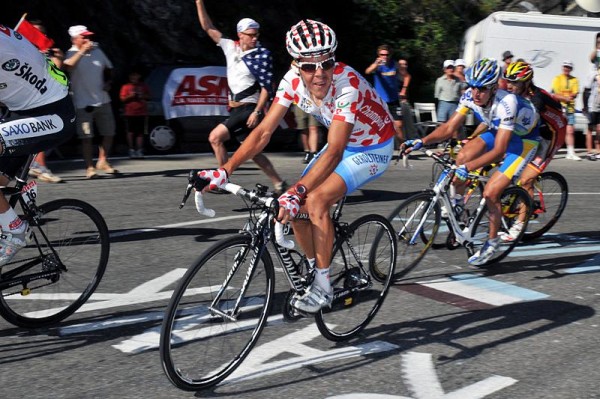
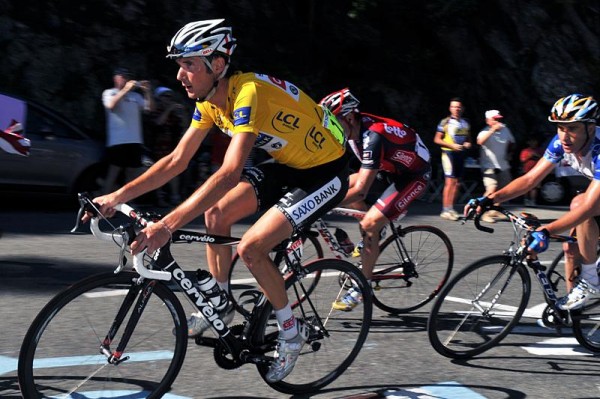
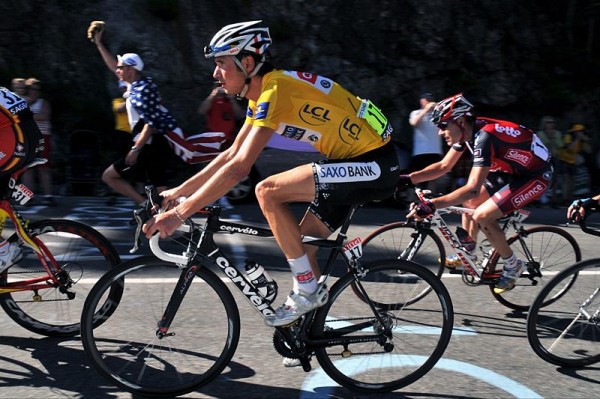
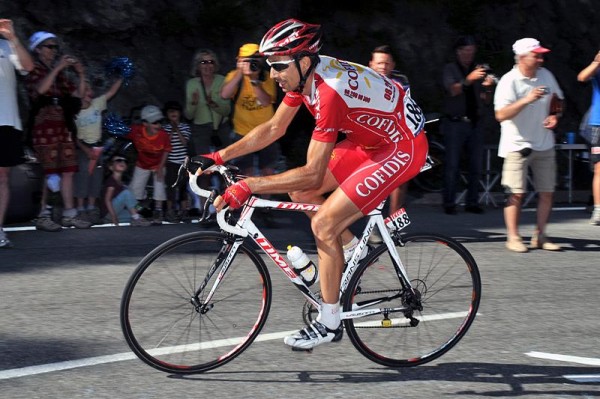
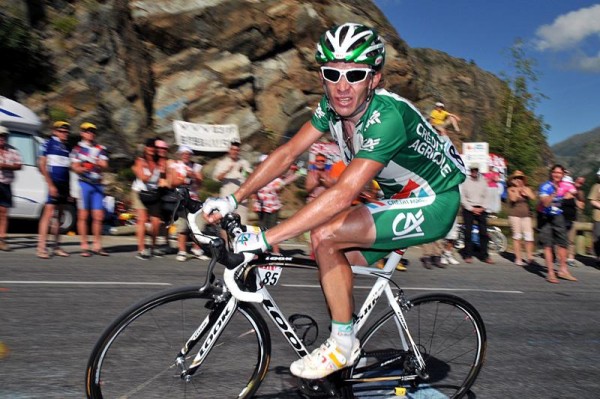
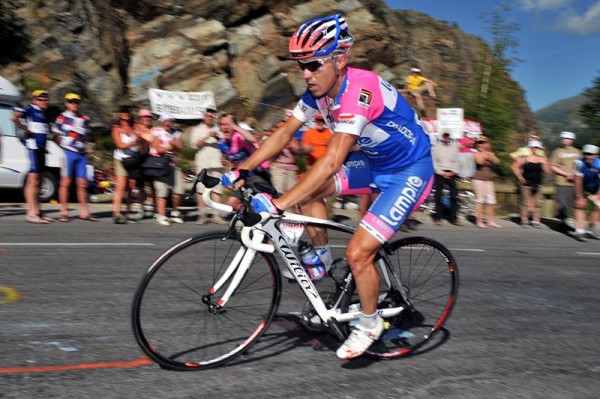
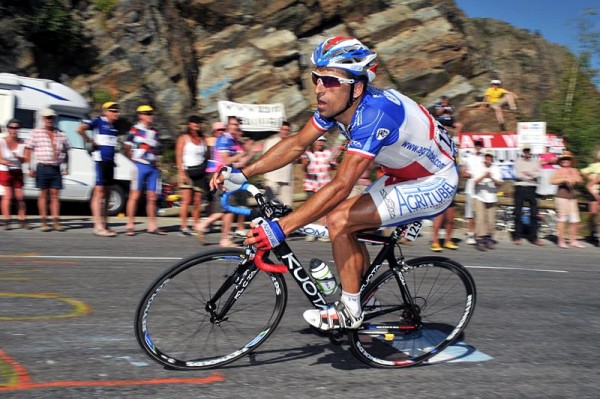
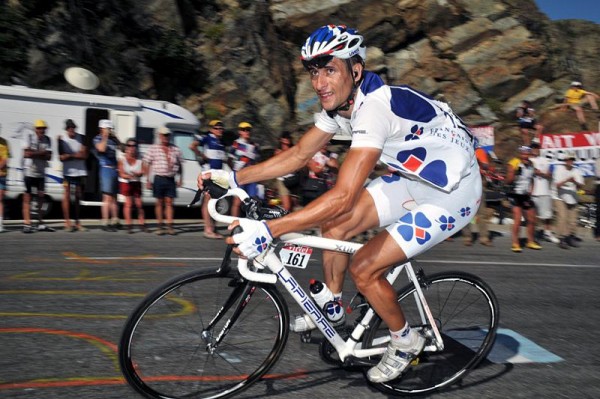
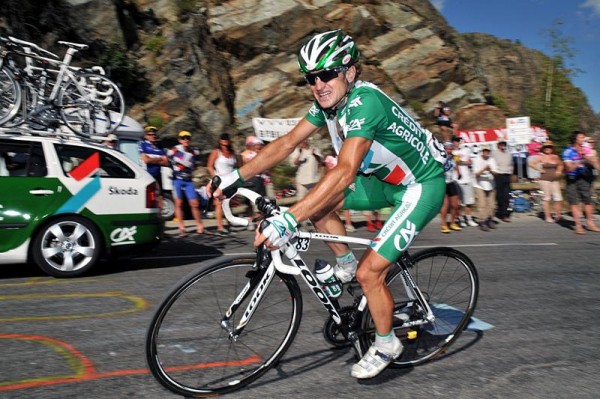
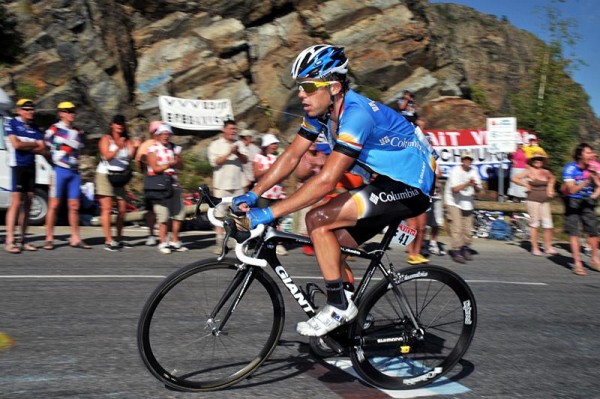
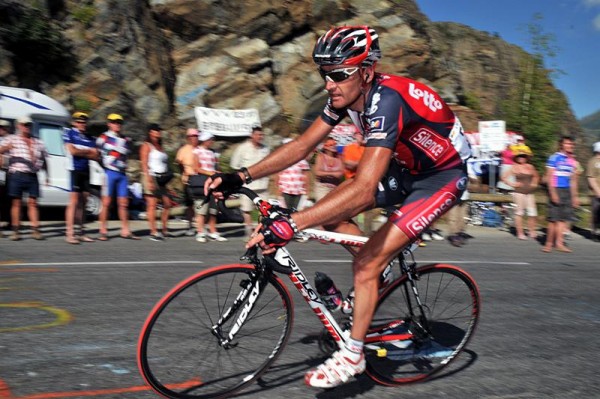
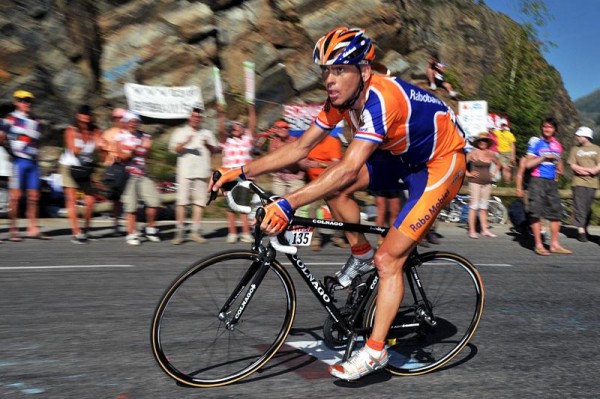
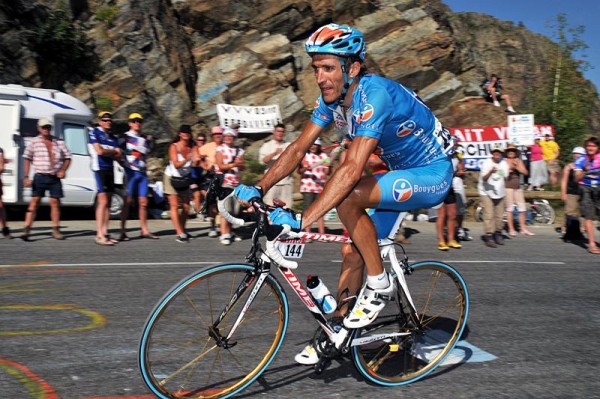
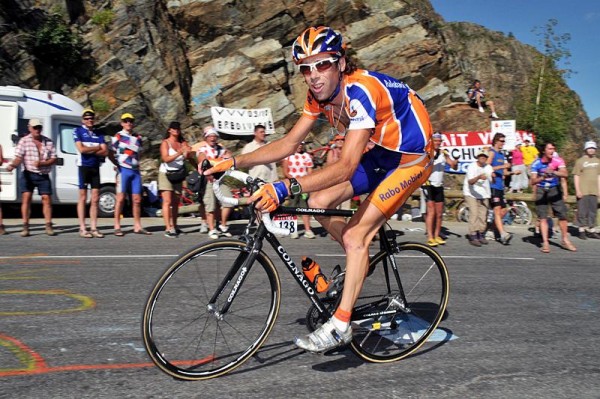
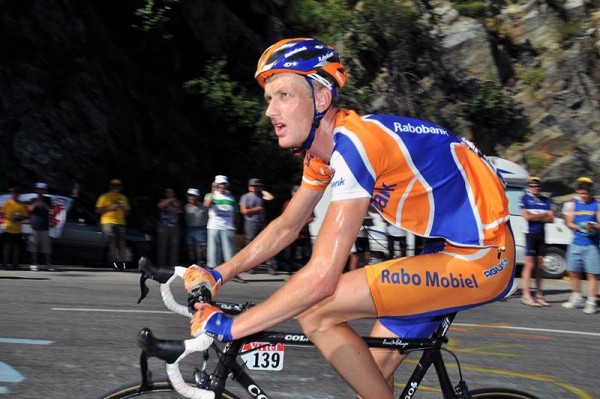
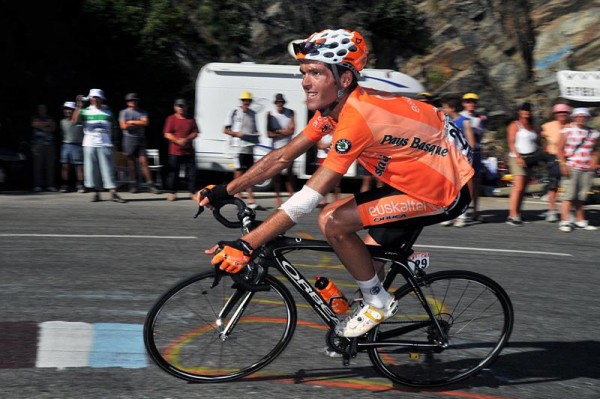
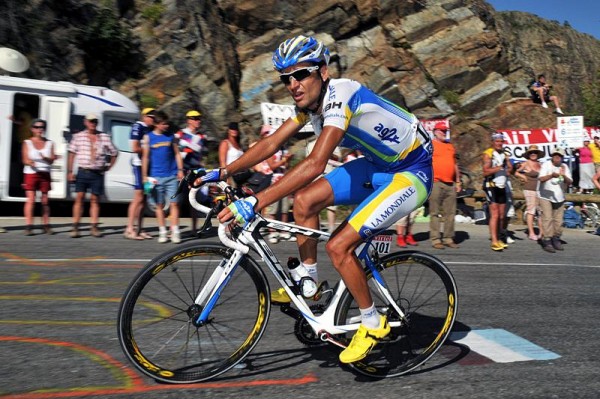
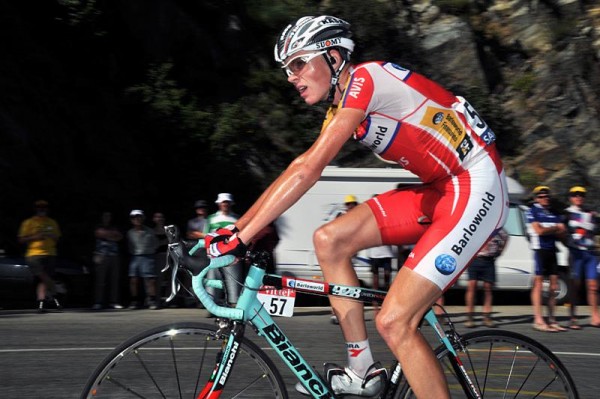
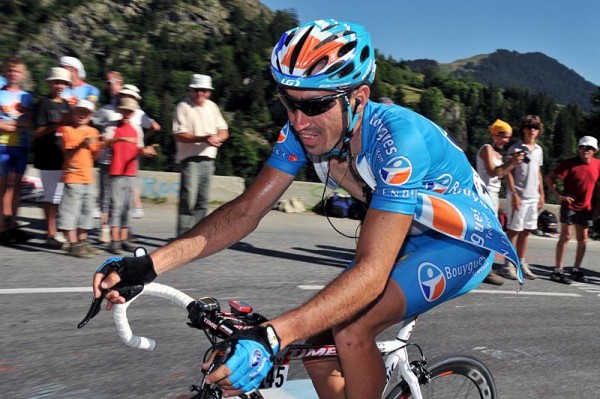
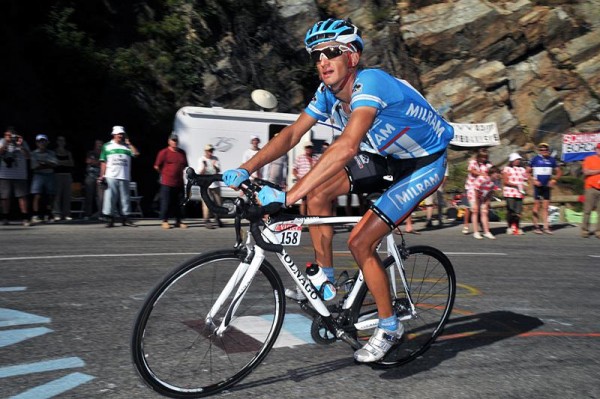
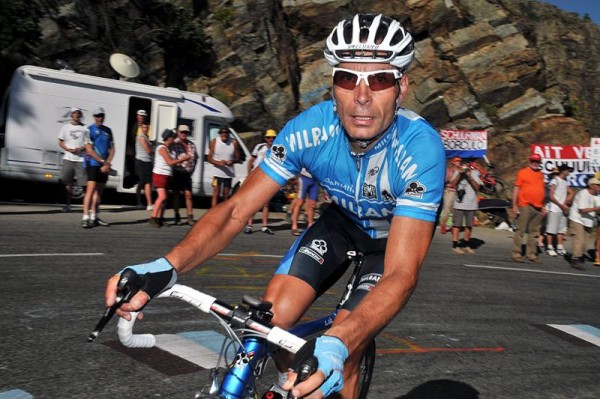
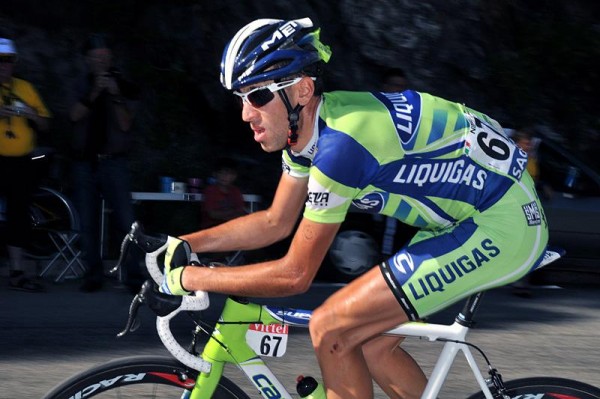
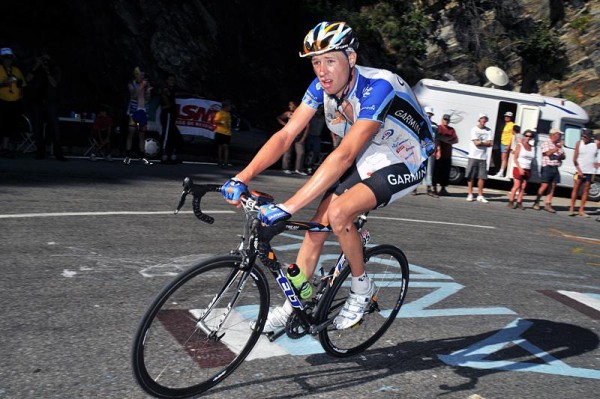
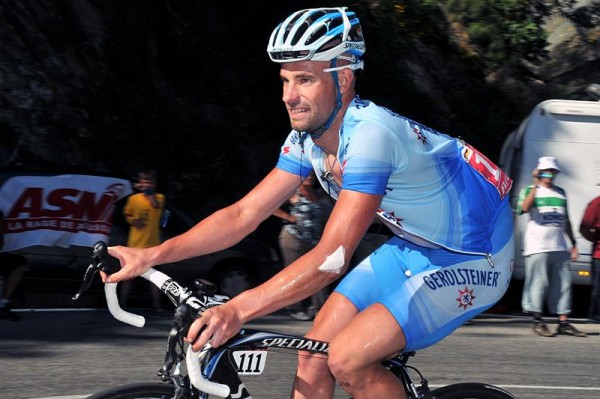
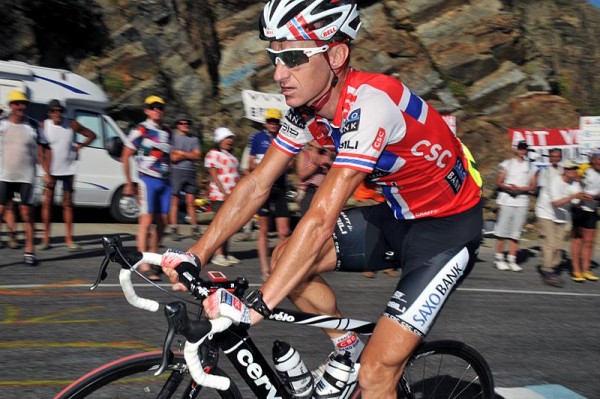
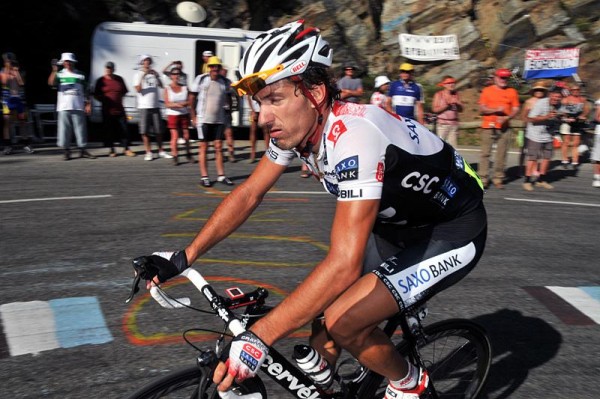
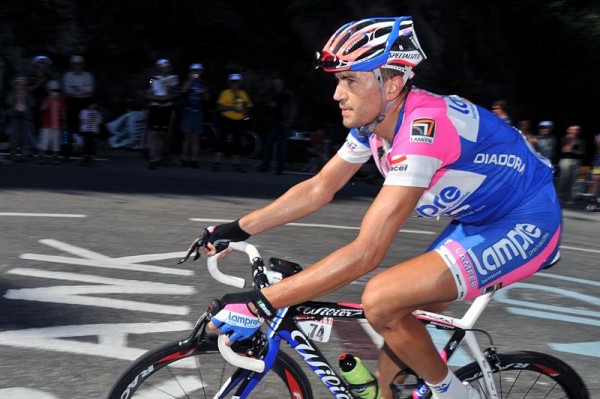
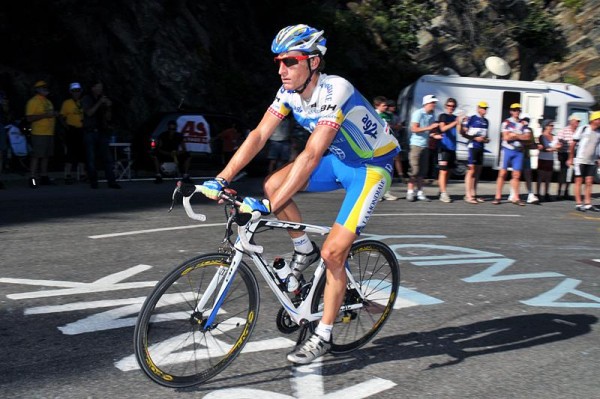
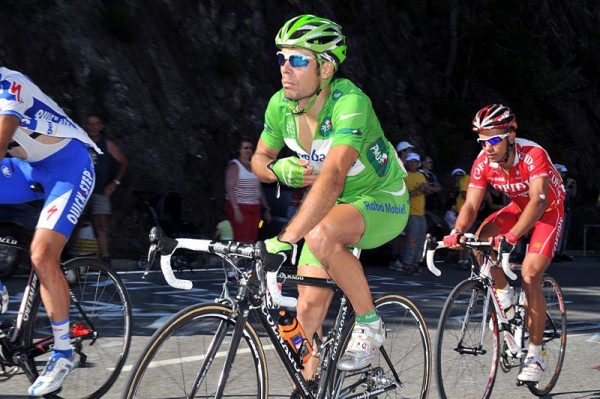
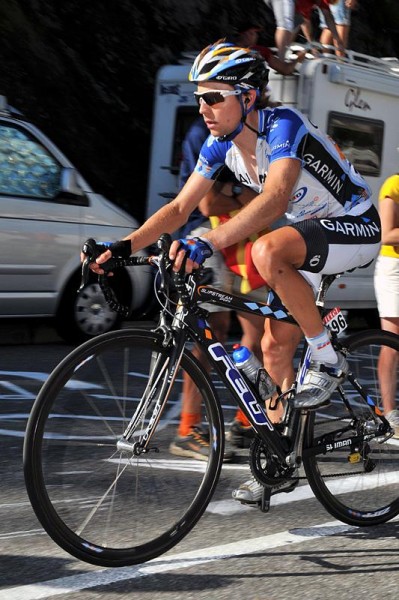
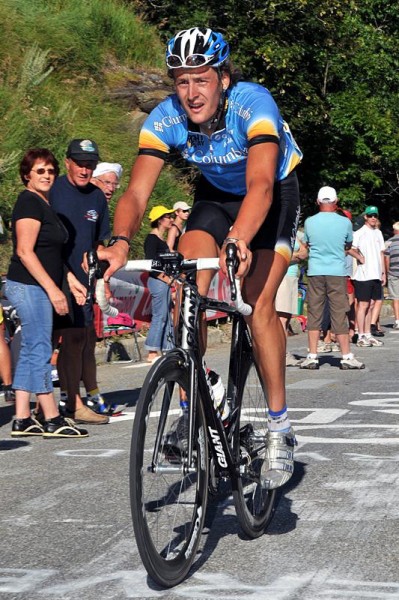
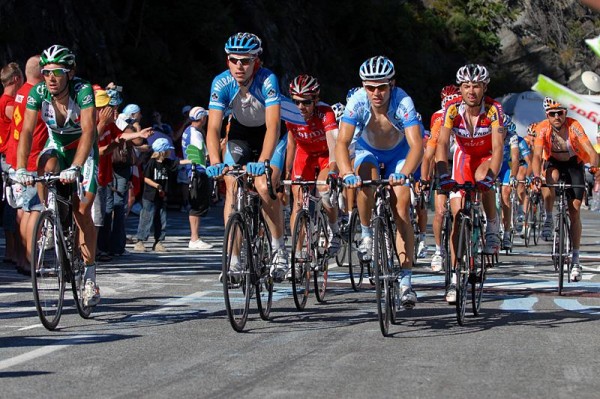
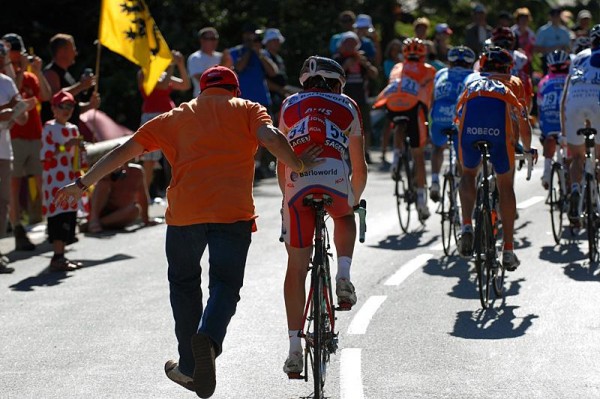
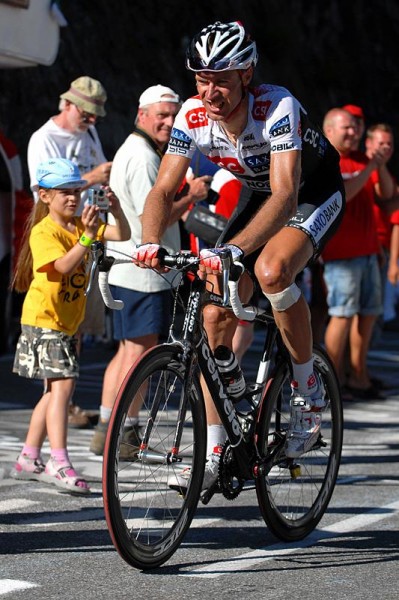
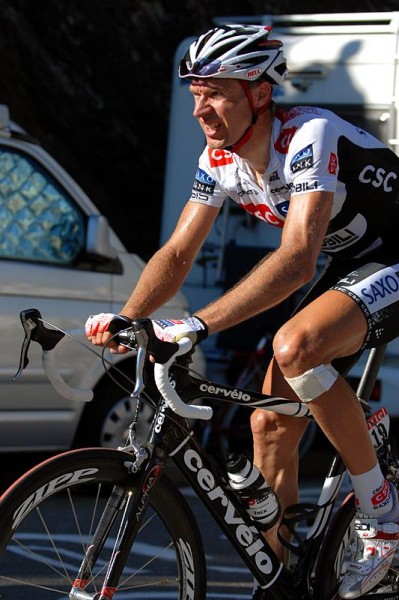
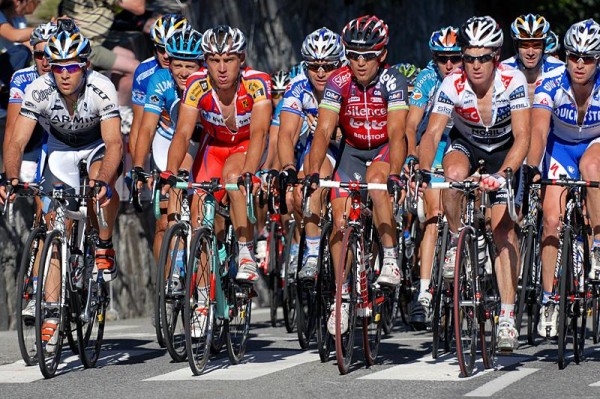
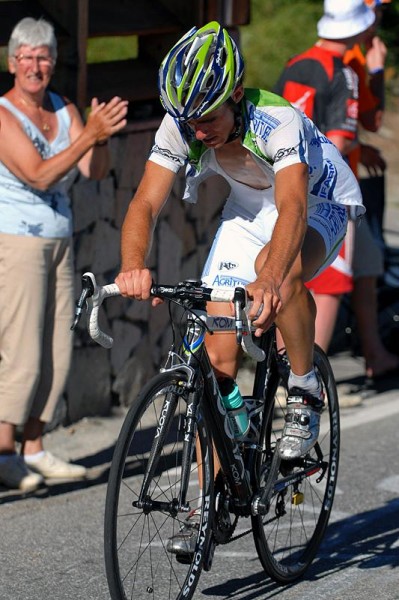
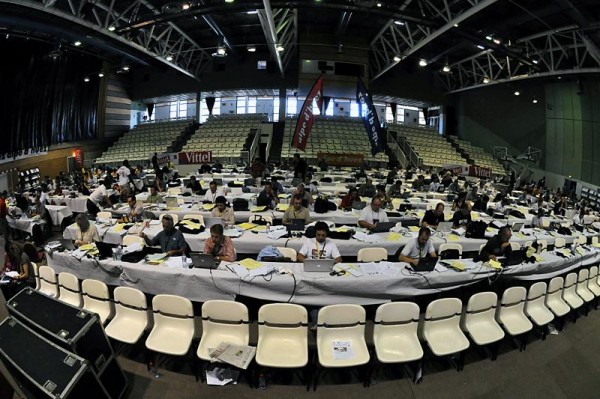
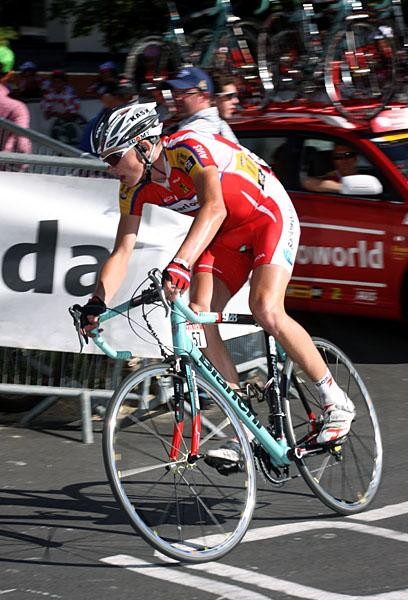
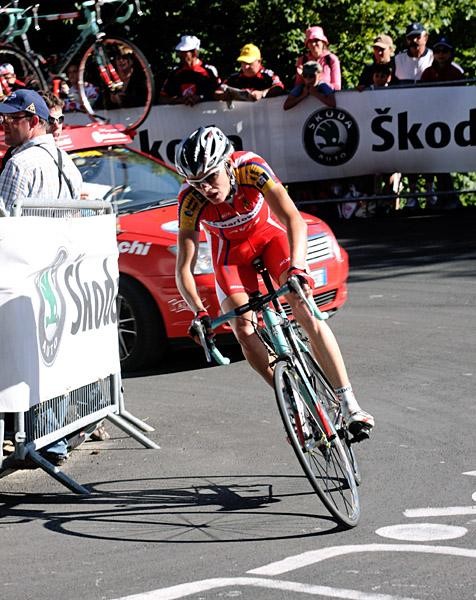
CSC-Saxo Bank musketeers put Sastre on top and in yellow
This evening in L'Alpe d'Huez, more than one bottle of champagne will pop in team CSC-Saxo Bank's hotel. After continuously building up the pressure against its rivals in this Tour de France, the Danish squad pulled off its greatest coup on the Queen stage of the event. Dominated by Riis' riders, the stage saw team captain Carlos Sastre score the victory on the epic slopes of L'Alpe d'Huez and take over the yellow jersey from team-mate Fränk Schleck.
The Spaniard took advantage of a huge team effort to attack right in the first metres of the ascent, barely coming out of Bourg d'Oisans. Nobody of the general classification leaders was able to follow at this stage, and Sastre continued his raid towards the top solo, never to be seen again. He finally finished 2'03 minutes ahead of Samuel Sanchez (Euskaltel-Euskadi), who came in second with Andy Schleck (CSC-Saxo Bank) in third position.
"I decided to attack from the start because everyone was tired from the CSC efforts on the Col de la Croix de Fer," Sastre explained. "I took off from the start to get as much time as possible. I knew I could do better at my own pace instead of having to face constant attacks."
The stage winner said that it had been his idea to attack at the base of the climb, but that this had only been made possible thanks to his team-mates. "Without their help I would not have done it. The Schleck brothers sacrificed themselves, and that is the philosophy of the team," he added.
The Spaniard was overjoyed to finally be wearing yellow, a jersey he had been chasing for years. Even in the Vuelta a España, where he has twice stood on the final podium, he only wore the leader's garment for one day, in 2006. "After so many years, I have to really thanks my team-mates, the Schleck bothers and Riis for the dream come true," an emotional Sastre said.
Team-mate Fränk Schleck wasn't unhappy to give away the jersey to Sastre, to the contrary. "That Carlos takes the jersey may be a little loss for me, but it's a full success today for the whole team," he said in the finish. "What we did today is fantastic. The boys were just so strong. Kurt, for example, did a hell of a job. Chapeau to him. He said this morning, 'boys, we need to hurt today', and he sacrificed himself completely."
His younger brother Andy, who retained the white jersey of best joung rider, was of the same opinion. "I'm so proud to be in this team," he said. "Today, we showed again that we are by far the strongest. Even a guy like Cancellara dropped the hammer on the climb for Carlos - and he's not a climber at all. It was fantastic today and I'm really, really happy for Carlos, because he has been hunting this for a long, long time. He worked so hard for this for many years, and now he gets it."
Sastre now has a 1'34 minutes advantage over Cadel Evans (Silence-Lotto) on the overall classification. Asked if that was enough of a lead for him to win the Tour, Fränk Schleck said, "I don't know. But as we want to win it, this was the right team tactic for today. The fact that we are the strongest team is our main asset. We tried, and it worked! First of all, we achieved a fantastic win here today, and secondly, Carlos has the jersey. Andy did a great job; he's in white; we have the team competition..."
Speculation now abounds as to the time trial capabilities of Sastre against his main rivals Cadel Evans (Silence-Lotto) and Denis Menchov (Rabobank), who also suffered today but finally managed to hold on to the main contenders' group. Evans lost 2'15 minutes on Sastre in L'Alpe d'Huez, finishing seventh. But the Australian played it cool, hoping to make up the gap again in the race's last time trial: "To be honest, I think it was not a time loss," he said in the finish. He started chasing Sastre and leading out the group by himself when the Spaniard's gap grew over two minutes. "There was no support, they all sat on. It was a headwind and the headwind probably worked in my advantage yesterday, but today they could obviously sit on the wheel and recover."
Menchov got dropped by Sastre's attack in the early part of the climb, but then came back to the group. He was obviously disappointed as he also lost 2'15 minutes on Sastre, but made it into the finish in Evans' group, placing eighth. Evans is therefore 1'05 minutes ahead of him on general classification. Regarding the time trial, the Rabobank leader said, "Anything is possible because Evans is a specialist. However, Carlos is also good. We will see, patience."
Garmin-Chipotle's GC captain Christian Vande Velde, as well as polkoadot jersey Bernhard Kohl (Gerolsteiner) all crossed the line within Evans' group. Vande Velde had some words of praise for the stage winner, Carlos Sastre. "It was uncaracteristic of Carlos to attack, he's usually sitting on the back," the American said. "He deserved it. He was awesome."
Vande Velde also thought that Sastre's advantage over Evans could be enough to take the yellow jersey to Paris. "Carlos isn't a horrible time triallist," he said. "Everyone has this perception, that if you're not in the top three then you can't time trial. But he's good. It's Cadel's race to lose."
Kohl now sits in third position on the overall, 1'33 minutes behind the new leader. But the Gerolsteiner rider's time trial abilities may not be enough to target a podium finish in Paris. "I don't think I can stay in the top three," Kohl said. "I might end up fifth or sixth, but even that is still very satisfying for me, as I hope to retain the polkadot jersey. That is more than I ever expected from this Tour, so I'm overjoyed."
The 2008 Tour de France overall victory is still very open after the race's last mountain day. With the top five riders all within 2'39 minutes, and a final time trial over 53 kilometres awaiting the riders next Saturday, the victory and podium placings will be decided between Sastre, Fränk Schleck, Kohl, Evans and Menchov. Place your bets.
How it unfolded
At 11:25 the 151 remaining riders set off under sunny skies and nervous stomachs as the day's hardest stage awaited: with three hors categorie climbs and the finish at Alpe d'Huez. It would be a make or break day for the main contenders, and they had perfect weather to wage their war. The temperature at the start was a comfortable 17 degrees, but the day would heat up as much as the racing action.
As the peloton passed the real start at 11:40, riders didn't hesitate to attack. Inside the first kilometre the first three to take off were Rubén Pérez (Euskaltel-Euskadi), Rémy Di Gregorio (Française des Jeux) and Peter Velits (Team Milram), and they quickly built up a lead of 1'30. After 14 kilometres, the previous day's most aggressive rider, Stefan Schumacher (Gerolsteiner), left the bunch and joined the break.
The four riders held 2'14" on the peloton as they crested the first climb of the day, the relatively miniscule category three côte de Sainte-Marguerite. Schumacher preceded Di Gregorio, Pérez and Velits. At the sprint in Monêtier-les-Bains 16 kilometres later, where Di Gregorio took the points ahead of Velits and Schumacher, the lead had doubled.
The leaders would enjoy an advantage of 5'47 at the base of the massive Col du Galibier, and once the CSC-Saxo Bank team put Nicki Sørensen on the front, his pace started to gradually eat away at the gap.
As the leaders neared the top of the Galibier, Pérez started to have trouble, but was close enough to catch up on the descent. Schumacher led Di Gregorio and Velits over the top. A bit more than five minutes later, Thomas Voeckler (Bouygues Telecom) jumped out of the bunch to battle for the mountain points. Fabian Wegmann led Bernhard Kohl back up to the Frenchman, with John-Lee Augustyn (Barloworld) up there as well. Augustyn had obviously recovered from his crash yesterday.
Voeckler had dropped back and then sprinted full gas in an attempt to surprise the Austrian between the motor bikes. A nice tactic, but it didn't work. Kohl paid attention and took the points for fifth, with Voeckler edging out Augustyn. Amets Txurruka (Euskaltel-Euskadi), Kanstantsin Siutsou (Columbia) and Carlos Barredo (Quick Step) received the remaining points.
The descent saw a number of crashes, but fortunately all riders were relatively unscathed and able to continue. In the breakaway, Di Gregorio had a bit of trouble and unclipped in a left hand turn. That threw off Perez, who ended up riding off to the right, but the meadow softened his fall.
In the peloton Freddy Bichot (Agritubel) and Adam Hansen (Columbia) went down as well, and later George Hincapie also had his turn on the pavement.
Voeckler kept going after the summit and descended by himself. He had done that multiple times during the Tour and seemed to be more comfortable riding down by himself. But he was joined by Amets Txurruka (Euskaltel-Euskadi) and Carlos Barredo (Quick Step). Vincenzo Nibali (Liquigas) also jumped across, but the four were caught by the fast charging peloton, still led by CSC.
The break was now losing ground. With 108 kilometres to go, the four hit the top of the Télégraphe, which didn't offer any mountain points this year. The lead was down to 3'29.
On the descent from the Télégraphe, Di Gregorio was going extremely careful and quickly lost contact with the leaders. At the bottom in Saint-Martin-d'Arc he was already down by half a minute with 97 kilometres left to go.
As the leaders approached the Col de la Croix de Fer, a sign read 29 kilometres to the top which was not a pretty sight. The lead of the trio out front had reached seven minutes, while Di Gregorio never made it back to the front.
With the start of the climb over, O'Grady had done his work. Cancellara took over for CSC and the gap started to drop. He set a terrible pace, catching and dropping Di Gregorio and putting the sprinters off the back. Even white jersey contenders Nibali and Maxime Monfort (Cofidis) gave up the ghost. Jimmy Casper (Agritubel) had been dropped early in the stage and was now 18 minutes behind and nearly assured of being time cut.
Up front, Pérez lost contact with Velits and was caught by the peloton, while Schumacher and Velits had only three minutes on the thinning bunch with ten kilometres to the top of the climb.
Seven kilometres from the top Schumacher couldn't hang on and was dropped by Velits. Schumacher was caught with less than five kilometres to the top. Velits still had a two-minute lead.
Velits crested the top of the Croix de Fer by himself. The yellow jersey group followed 1'11 later. The group had grown again towards the top and included Fränk Schleck, Andy Schleck, Kurt-Asle Arvesen and Carlos Sastre (CSC-Saxo Bank), Cadel Evans (Silence-Lotto), Christian Vande Velde (Garmin Chipotle - H30), Alejandro Valverde (Caisse d'Epargne), Bernhard Kohl (Gerolsteiner), Denis Menchov (Rabobank), Pieter Weening (Rabobank), David Moncoutié (Cofidis), Tadej Valjavec (AG2R La Mondiale), Kanstantsin Siutsou (Columbia), Samuel Sánchez (Euskaltel-Euskadi), Sandy Casar (Française des Jeux), Chris Froome (Barloworld), Johan Van Summeren (Silence-Lotto).
The order over the top was Velits, Kohl, Arvesen, Andy Schleck, Vande Velde, Fränk Schleck, Froome, Siutsou and Sastre.
Cunego, who has struggled on the climbs for the entire Tour was once again chasing over the top, but was able to make it back to the front on the descent. Others like Popovych and even Van Summeren came back as well.
On the early part of the descent, Pineau jumped out of the group and while he struggled to make ground on the descent, the Frenchman worked his way up to Velits in the valley, and caught up with 30 kilometres to go, just in time to 'win' the sprint in Bourg-d'Oisans.
Even though the pair worked together, it was clear that the pace of the CSC-Saxo Bank squad would not let any break survive. Velits dropped back first, then Pineau got reeled in thanks to the work of Arvesen and Cancellara.
At the base of the Alpe, Sastre was the first to give it a go. He was marked by Menchov, and the accelerations quickly thinned the group, dropping Cunego and Kirchen, among many others. Sastre's second attack was the bonne. He sped away, while the group behind formed around yellow jersey Fränk Schleck. His brother Andy, Kohl, Evans, Valverde, Vande Velde, and the very strong AG2R trio of Efimkin, Valjavec and Goubert hanging on.
Menchov soon paid for his efforts to stay with Sastre. He fell out of the yellow jersey group and quickly lost 30 seconds. But he measured himself well, and inched his way back to within some ten seconds.
On the front, Sastre fought on by himself. He had 55 seconds on the group with eight kilometres to go. Accelerations by riders like Goubert were always answered by Andy Schleck. With the younger brother easily able to answer any attack, the group stayed together and with six kilometres to go, Menchov was finally back in the group.
Sastre hit the five-kilometre to go sign with a lead of 1'50. It was now up to Evans to take over the pace making to limit his time loss to the Spaniard. CSC had the best cards to play, but an expected attack from Fränk Schleck never came.
3.5 kilometres from the finish Efimkin attacked, but again Andy Schleck marked him. The final acceleration came from Samuel Sánchez, less than two kilometres from the line. The two came in two minutes after Sastre and ten seconds ahead of the yellow jersey group.
Stage 18 - Thursday, July 24: Bourg d'Oisans - Saint Étienne, 196.5km
The Alps are behind us now, but this stage is by no means flat with a third, a second and a fourth category climb en route. The course doesn't suit the sprinters, but neither is it tough enough for the climbers and overall contenders, for this reason it has breakaway written all over it. Anyone who has managed to save a bit of energy over the preceding few days will have a go here and in all likelihood the time gap allowed will be enormous providing nobody of any note is in the break.
Bourg d'Oisans has been a stage start time 19 times before, but has never hosted a finish. Sitting as it is at the foot of Alpe d'Huez, it is a natural choice for the next day's stage. The last time a stage started here was in 2006 when the course headed north to another mountaintop finish at La Toussuire. Danish super-climber Michael Rasmussen (Rabobank) took the victory alone on his way to taking the polka dot mountain jersey.
Saint Etienne is another regular Tour host, having been a stage town 23 times before, partly because it used to be the centre of the French bicycle industry. Last time the Tour was here it saw Lance Armstrong (Discovery Channel) cement his seventh and final Tour de France by taking victory in the final time trial of the 2005 race. That day also saw the tragicomic end to Michael Rasmussen's (Rabobank) hope of a podium place, as a disastrous ride saw him crash twice and change his bike three times.
Get The Leadout Newsletter
The latest race content, interviews, features, reviews and expert buying guides, direct to your inbox!
Latest on Cyclingnews
-
‘That first sector, it's just bodies falling’ – Oscar Chamberlain soaks up debut Paris-Roubaix while providing spark of hope for Australian resurgence
One of just three riders from nation lining up to take on the brutal cobbled test, the second-youngest rider in race is first Australian across line in 82nd place -
USA CRITS: Michael Garrison wins Rock&Road Criterium well ahead of Lucas Bourgoyne
Shannon Koch leads trio of Kingdom Elite riders for sweep of women's podium in Newnan, Georgia -
The highs and lows of Paris-Roubaix: Rory Townsend makes the break for Q36.5 as Joey Pidcock rolls in last
Doug Ryder's squad experienced all the emotions at the Hell of the North -
Fred Wright overcomes Shimano Di2 crash mode, avoids late wrong turn to grab Paris-Roubaix top 10
Briton says his next goal will be 'working out how to not be the best of the rest' after career-best finish
